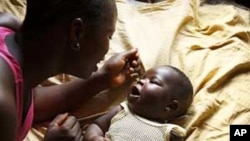In Ghana, traditional practices can both help, and harm, pregnant women.
Health experts cite the positive example of exclusive breast-feeding for the first six months after birth.
Elizabeth Wriglet a senior nursing officer in Accra says the practice is beneficial to both mothers and babies.
“It helps to establish a bond between the mother and child, it boosts the child’s immunity and it is easily accessible and affordable,” she explains.
Science has also shown that children who are fed on strictly breast milk for the first six months of their lives are healthier than children who are also fed water and food. That’s because water and food can be contaminated, leading to diarrhea and other illnesses. The rich nutrients in the milk include protective enzymes that coat a baby's stomach, and even prevent the spread of HIV from an infected mother to the infant.
Painful and dangerous
But childbirth may be difficult for women who follow other traditions, including one called “dry sex,” which involves the use of herbs for drying out the vagina.
Dennis Bortey, a medical officer at a private clinic in Accra, says people wrongly believe the practice helps heighten male pleasure during intercourse.
The practice may cause lead to inflammation and harm a woman's cervix, which can lead to complications during labor, according to Bortey. It could also lead to cancer.
A painful right of passage
A second harmful tradition for women is female circumcision, often referred to as female genital mutilation, or FGM.
The procedure involves the removal of part of a girl’s genitalia largely for cultural reasons, like reducing her sex drive in order to prevent promiscuity. The practice is common among women in about half of all African countries.
In Ghana, FGM is mostly practiced in the north, despite a ten-year-old law banning it.
But the process can cause both immediate and long-term health problems for women.
Any physical damage to the birth canal caused by FGM can later lead to complications during birth, including fistula, a tear in the tissue of the cervix, bladder or rectum through which urine or feces can leak. Until it’s repaired, the condition can lead to infection and social ostracism.
Bortey said the procedure is often done by untrained personnel using crude instruments that may not be sterilized. As a result, women may suffer infection, including tetanus.
Fistulas can be repaired.
But that's not the case with other complications caused by female genital mutilation, like hemorraghing and obstructed labor. With a shortage of available obstetric clinics and skilled midwives, the harmful effects of FGM often means death for both the mother and infant.






